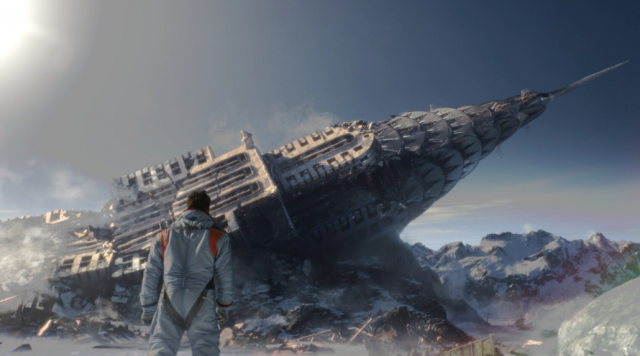Review: ‘Moonfall’ and the death of the 2000s-style disaster flick
Despite being filled with heavy doses of CGI spectacle, the film fails to make an impact

No one walks into a theatre to watch Moonfall expecting cinematic excellence. There is an understanding between the audience and the filmmakers, well before the blank screen is replaced with images of impending doom and disaster, that the film concerns itself with spectacle above all else. A cogent plot and believable acting are nestled into the nether regions of the spectrum of importance, with sound and CGI reigning supreme. For what it’s worth, when it comes to the latter, the film does deliver.
In typical Robert Emmerich fashion, the disaster-philiac director of the film known widely for his other apocalyptic offerings like 2012 and The Day After Tomorrow, massive tidal waves engulf entire cities, fiery moonrock hurtles towards humanity in droves and the ground quakes to the point of cracking open. In theory, Moonfall appears to be the perfect theme park ride of a film that offers adventure, adrenaline spikes and generous amounts of cheesy entertainment value underscored by a mediocre emotional storyline for audiences seeking out a brainless watch.
Yet, when it comes to the actual film, the grand displays of destruction and the accompanying race to contain the apparent annihilation of humanity fail to encourage much excitement, giving way instead to a kind of weary boredom, signalling an end of another variety, of the 2000s-style disaster film as it has been known and once widely loved.
Moonfall’s premise is strategically simple. The moon has been knocked out of orbit by an unidentifiable amorphous black mass burrowing inside it and is now hurtling towards earth, while the planet’s climate grows steadily more inhospitable for humans in response (cue the CGI tidal waves). Ultimate annihilation is on its way as the moon, or a trillion relatively tiny pieces of it, threaten to crash into earth in a matter of three days.
The American government, in perhaps the most believable bit of the film, wants to nuke the moon. Alternatively, NASA director Jocinda Fowler (Halle Berry) and disgraced astronaut Brian Harper (Patrick Wilson), both of whom have previously encountered the menacing lunar entity, seek relatively less cataclysmic solutions. They enlist the help of self-educated rocket scientist and part-time moon conspiracy theorist KC Houseman (John Bradley), who believes the moon to be a megastructure built by aliens to harness the power of a dead star, to conduct an Armageddon-style mission to outer space in order to correct galactic wrongs.
Lunar discoveries are made of the staple sci-fi variety, the black goo is annihilated, and the world is ‘saved’ in typical self-indulgent American fashion. The viewer leaves the cinema hall thoroughly unimpressed. Perhaps in a world where the morning news is inundated with images of climactic destruction, from wildfires that tint the sky an apocalyptic red to floods steadily nearing biblical proportions, disaster has become daily fare. Spectacle alone can no longer cut it.
Moonfall, however, is not devoid of a story. Apart from the obvious sci-fi plot, the film is about parents trying to save a dying world for their children. For both Fowler and Harper, the desire to protect their children serves as the primary motivation to strap themselves into an ancient rocketship fresh out of a vandalised museum exhibit and blast off into space, with redemption from the failures of their previous tragic mission coming in a close second.
Unfortunately, the subplot suffers not only due to its cliched nature, which may, when best utilised, bring a sense of comfort to cinema-goers, but also because of the emotionally dead, paper-thin and painfully stiff performances, particularly by Wilson and Charlie Plummer, who plays Harper’s son.
There is one narrative, however, that permeates the film, and in fact the 2000s-style disaster genre as a whole, far more thoroughly than any level of familial love, and can perhaps be considered one of the primary reasons for the now-obvious global disinterest in it. At the very core of the film lies the inescapable story of American triumphalism.
Not only does the fate of the world lie in the hands of two Americans, which is an understandable plot point coming out of a big-budget Hollywood film, but true shelter is only found in mountainous military bunkers, nestled within the third act of the film is a ten-minute long Lexus car commercial that sees Fowler and Harper’s families escape a “gravity wave” in the vehicle, and, when pressed for inspiration, a starry-eyed Houseman gazes upon a SpaceX poster, unironically uttering the reverential words, “What would Elon do?”
Much of the world is destroyed due to the cataclysmic side-effects of the moon moving closer and closer to earth, with Bangladesh being swept away by massive ocean waves and a stereotypically Middle Eastern man with a thick accent on the news warning the people of God’s wrath. Descending into chaos and mass death, a large part of the earth, and the humanity that it houses, appear to perish. America, however, and the nuclear family at the very heart of it, persists, gazing upon a freshly destroyed world full of limitless possibilities.



















COMMENTS
Comments are moderated and generally will be posted if they are on-topic and not abusive.
For more information, please see our Comments FAQ